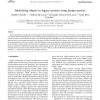Free Online Productivity Tools
i2Speak
i2Symbol
i2OCR
iTex2Img
iWeb2Print
iWeb2Shot
i2Type
iPdf2Split
iPdf2Merge
i2Bopomofo
i2Arabic
i2Style
i2Image
i2PDF
iLatex2Rtf
Sci2ools
139
click to vote
IWPC
1997
IEEE
1997
IEEE
Identifying objects in legacy systems
Many organisations are migrating towards object-oriented technology. However, owing to the business value of legacy software, new object-oriented development has to be weighed against salvaging strategies. The incremental migration of procedurally oriented systems to object-oriented platforms seems to be a feasible approach, although it must be considered as risky as redevelopment. This uses reverse engineering activities to abstract an object-oriented model from legacy code. The paper presents a method for decomposing legacy systems into objects. The identi®cation of objects is centred around persistent data stores, such as ®les or tables in the database, while programs and routines are candidates for implementing the object methods. Associating the methods to the objects is achieved by optimising selected object-oriented design metrics. The rationale behind this choice is that the object-oriented decomposition of a legacy system should not result in a poor design, as this would ma...
Related Content
| Added | 06 Aug 2010 |
| Updated | 06 Aug 2010 |
| Type | Conference |
| Year | 1997 |
| Where | IWPC |
| Authors | Aniello Cimitile, Andrea De Lucia, Giuseppe A. Di Lucca, Anna Rita Fasolino |
Comments (0)

